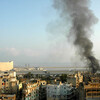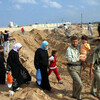
According to official sources, more than 650 people have been wounded and more than 180 killed in Lebanon since the conflict broke out on 12 July. The south is the area that has witnessed the most violence and casualties but the southern suburbs of Beirut, the Bekaa valley and the north have suffered as well. More than 100 villages and towns have been targeted in sea, land or air attacks (or a combination thereof). Although a great many people are fleeing the south and the southern suburbs of Beirut, their numbers are impossible to estimate at this time. Displaced persons are mostly staying in overcrowded schools and outdoor parks. Moreover, tens of thousands of people have crossed into Syria. Read more about ICRC Bulletin No. 1 - Lebanon/Israel (12-18 July 2006)

Last Thursday (13 July) was particularly heavy in terms of casualties, as the Palestinian Ministry of Health announced the death of 26 people within 24 hours. During the reporting period, air, land and sea shelling continued in various areas of the Gaza Strip, causing many casualties, including civilians. On 13 July, the Israeli Defense Forces (IDF) declared the central part of the Gaza Strip a closed military zone and imposed a curfew on its 1,200 residents till the next day. On 16 July, the IDF heavily shelled Beit Hanun. The exact number of casualties is unknown, but at least three houses were destroyed. Read more about ICRC bulletin - Gaza

The humanitarian situation in Gaza remains precarious as its 1.4 million inhabitants suffer the effects of the Israeli operation “Summer Rain.” The number of casualties is increasing daily. As at 10 July 55 Palestinians had been killed and over 180 injured since the beginning of the operation, according to the Palestinian Ministry of Health. These numbers include both civilians and militants. On the Israeli side, one soldier had been killed in action. Infrastructure was the main target during the first days of the Israeli military operation. Read more about ICRC bulletin - Gaza

The ICRC is following the military developments in Lebanon and northern Israel with great concern, as these events are having a serious impact on civilians. According to the latest reports, almost 50 civilians have been killed inside Lebanon as a result of bombing and rocket attacks. Military action in the south of the country has caused extensive damage to infrastructure, including roads and major bridges. The civilian airport in Beirut was bombed by the Israeli Air Force on the morning of 13 July. The ICRC is also alarmed by reports that several civilians were killed and dozens of people were injured when Hezbollah fired rockets into cities in northern Israel. Read more about Israel and Lebanon: ICRC gravely concerned about the plight of civilians caught up in hostilities

The International Committee of the Red Cross (ICRC) is alarmed about the deteriorating situation in the Gaza Strip. The continuing escalation of violence, with military operations taking place in highly populated areas, has serious consequences for the civilian population. Over the past two weeks, Israeli military operations in the Gaza Strip have led to the deaths of dozens of people and the wounding of many more, among them a large number of civilians. In one single incident on 12 July, nine family members – including children – were killed in their home by an air strike in Gaza City. In some cases, people living near operations have been unable to leave their homes for several days. Read more about ICRC gravely concerned about humanitarian situation in Gaza

The situation in the Gaza strip remains tense with the escalation of violence having a serious impact on the population there. The number of casualties, including civilians, is increasing by the day. The ongoing military operation in the north of the Gaza Strip has had a very serious impact on the population living there in terms of access to basic goods and services, including food. In particular, restrictions of movement and the shortage of electricity following the destruction of Gaza’s only power plant are having serious consequences. The ICRC’s head of sub-delegation in Gaza, Giorgios Georgantas, gave this interview. Read more about ICRC: "Continuing violence in Gaza increases hardship"

The International Committee of the Red Cross (ICRC) is increasing by roughly a quarter its 2006 budget for its activities in Israel and the occupied and autonomous territories, bringing the overall figure to more than 52 million Swiss francs. The additional funding will provide the means to meet most acute needs of Palestinians affected by the current crisis, particularly in the faltering health-care sector. The ICRC will fund the purchase of medical supplies and cover salaries and running costs to help the Palestine Red Crescent Society operate four hospitals, 30 primary health-care centres and ambulance services. The ability to provide these services has been severely jeopardized by the fact that the Society no longer receives funding from the Palestinian Authority. Read more about ICRC steps up aid, calls for action to avert major humanitarian crisis

The director of operations of the International Committee of the Red Cross (ICRC), Pierre Krähenbühl, has just ended a week-long visit to Israel and the occupied and autonomous Palestinian territories. Under International Humanitarian Law, it is the responsibility of the State of Israel to ensure that the basic needs of the civilian population in the occupied territories are met. These needs include foodstuffs, medical supplies, means of shelter and other essentials. Moreover, the law requires all States party to the Geneva Conventions to allow the free passage of essential humanitarian supplies. Read more about ICRC concerned over deteriorating situation in occupied Palestinian territory

The International Committee of the Red Cross (ICRC) is concerned about the situation in the occupied Palestinian territories following the attack by the Israel Defense Forces (IDF) on the prison in Jerichoand the abduction of civilians by Palestinian gunmen in the Gaza Strip. The civilians abducted included humanitarian workers and an ICRC delegate, who was later released. While military operations were still under way in Jericho, the ICRC reminded the Israeli authorities of their obligations under international humanitarian law. Detainees who are not participating in hostilities are protected under this body of law and are not military targets. Read more about ICRC concerned following events in Jericho

The International Committee of the Red Cross has continued to conduct its activities in Israeli places of detention during the current hunger strike by Palestinian security detainees. In particular, over the last 10 days the organization has begun a round of visits to all prisons housing detainees on strike, while maintaining close contact with their families and groups representing them. The ICRC plans to strengthen its team of medical doctors visiting places of detention, with a view to stepping up its monitoring of health conditions and access to medical care there. During the visits, the doctors will stress the possible health consequences of the strike. Read more about Red Cross visits detainees on hunger strike










